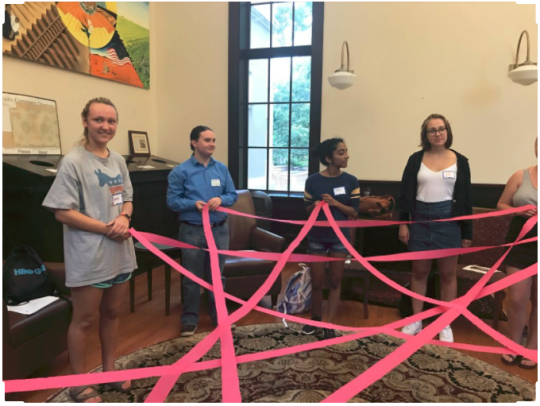The following blog was written by Veda Patil, one of our first-year Bonners. Veda primarily assists our Youth & Education programming and deepens the intersection between our education and oral history facets. The original posting can be found here.

Before I was a Bonner, I didn’t think I could be one.
When I heard about the Bonner Leaders Program at orientation this summer, I wasn’t sure it was something I was cut out for. It sounded like a program for students who had it all figured out–students who were motivated, organized, and knew what they were doing. Standing there in my wrinkled, not-as-cute 2nd day orientation clothes, I didn’t feel put together at all. Try terribly confused and overwhelmed instead.
All I knew was that a.) I needed work-study, b.) I was interested in social justice, and c.) being a Bonner seemed aspirational, a vision of the person I could be in college. The confident, dedicated, accomplished student, unconstrained by the social trappings and limited possibilities of high school. Once I returned home, I was plagued by self-doubt and skepticism. Can you really do this? I recall thinking as I scrolled through the Campus Y website. You barely made it into UNC, after all.
Needless to say, this type of thinking isn’t very conducive to a healthy self-esteem. Time and time again throughout my life, my anxiety is something I’ve tried to gloss over and push away. Yet if there’s one thing I’ve learned from being a Bonner, it’s that making decisions out of fear is never a good way to make decisions. I owe it to my supportive, encouraging group of friends that I’m even a Bonner in the first place.
Now that I’m here, however, there are a few other lessons I can take away from my first semester.
1. The first step to create positive change is to listen.
I have the privilege of working with the most fantastic community partner, the Marian Cheek Jackson Center for Saving and Making History. They’re a local community center dedicated to serving the historically black Northside neighborhood and preserving Chapel Hill’s local civil rights legacy, primarily in the form of interviews and oral histories. I’ve spent time transcribing interviews, analyzing pictures, and just listening, truly listening, to the countless stories of struggle, triumph, pride and love that are preserved at the Jackson Center. It’s okay to not to be at the center of every conversation. It’s okay to not “get a word in” sometimes. Talking is important, but listening is underrated.
2. Little actions matter.
In the world of service, it’s easy to feel lost as you perform seemingly menial tasks: delivering newsletters, entering numbers into spreadsheets, flattening cardboard boxes. When you aren’t performing at an executive level, it can sometimes feel like you don’t have purpose or a voice.
Yet doing these tasks is a lesson in discipline and humility that I think I’ll only truly comprehend later in life. It’s small actions that form the backbone of significant change.
3. Community is everywhere if you choose to embrace it.
Loneliness was a huge concern for me as I started college. The thought of starting over was simultaneously refreshing and daunting, and I quickly learned that so many interactions in college feel ephemeral. You can sit beside someone for a whole semester and never know their name. You can encounter the same people at the water fountain, in the student union or at the dining hall and never get to know them. Everyone is afraid to reach out, and each person has their own schedule and responsibilities.
When I started as a Bonner and began work at the Jackson Center, I was surprised at how much a sense of belonging and togetherness was emphasized. People in these communities truly care for and value each other. To me, this has been the most gratifying part of being a Bonner. I feel welcomed and heard, not just another name or ID number among a sea of students. Thinking back to that day at orientation, I want to tell myself that you don’t have to be “put together” to take initiative–change comes one step at a time, as long as you’re willing to push yourself forward.

Leave a Reply